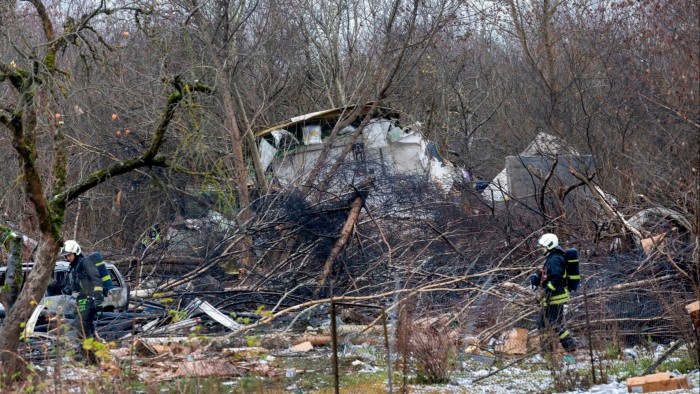Unlock the Editor’s Digest for free
Roula Khalaf, Editor of the FT, selects her favourite stories in this weekly newsletter.
A DHL cargo plane crashed into a house in the Lithuanian capital of Vilnius after attempting to make an emergency landing, killing a crew member and injuring three people.
The plane, which took off from the German city of Leipzig, crashed at about 5.30am local time on Monday into a house near Vilnius airport. All 12 inhabitants of the house survived, according to emergency services.
Police said they were investigating the crash, with a technical fault or human error as the most likely cause. But Arūnas Paulauskas, head of Lithuanian police, refused to rule out terrorism as a possible cause.
“The inspection of the scene, the collection of evidence could take a week. There will be no answers soon,” he added.
DHL, the German parcel group, has been the target of two parcel fires in recent months involving packages sent from Lithuania. The incidents have been linked by the country’s officials to Russian military intelligence.
Germany said last month that it had narrowly avoided a plane crash when a parcel destined for an aircraft’s hold burst into flames before the flight at a DHL logistics centre in Leipzig.
The UK’s counterterrorism police are also investigating the origins of another package that caught fire at a DHL depot in Birmingham in July.
Kęstutis Budrys, national security adviser to Lithuania’s President Gitanas Nausėda, said this month that Russian military intelligence was behind the attacks. Two European security officials said the incidents were designed to test whether flights bound for the US could be attacked in the same manner.
DHL said the plane had “made an emergency landing” approximately 1km from Vilnius airport but did not provide more details, adding only that the cause of the accident was unknown and investigations were under way.
The plane was operated by the Spanish airline Swiftair for DHL, and the crew member who died was a Spanish national. Lithuania’s national crisis management centre told Reuters it had no data at present to suggest there had been an explosion before the crash.
The aircraft was destroyed by the crash, with wreckage and cargo strewn over a large area close to the airport, according to police.
Darius Jauniškis, head of the State Security Department, Lithuania’s intelligence agency, said no cause for the crash could yet be established but also refused to rule out terrorism.
“We see Russia becoming more aggressive. Foreign partners have talked about the dangers of sabotage, a certain threat of terrorism,” said Jauniškis, who cautioned it was still too early to apportion blame for the crash.
A spokesperson for the German interior ministry said: “We can’t ascertain the cause of the accident yet. The ministry with its law enforcement agencies support the investigation and . . . are in contact with their Lithuanian partner.”
“Our security agencies warned at the end of August about incendiary devices. However, we do not yet see any indications of possible connections with today’s air crash.”
Additional reporting by Guy Chazan in Berlin
Read the full article here

